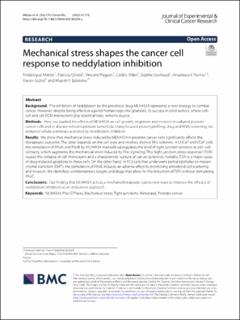| dc.contributor.author | Mittler, Frédérique | |
| dc.contributor.author | Obeïd, Patricia | |
| dc.contributor.author | Haguet, Vincent | |
| dc.contributor.author | Allier, Cédric | |
| dc.contributor.author | Gerbaud, Sophie | |
| dc.contributor.author | Rulina, Anastasiia | |
| dc.contributor.author | Gidrol, Xavier | |
| dc.contributor.author | Balakirev, Maxim Y. | |
| dc.date.accessioned | 2022-06-29T06:40:16Z | |
| dc.date.available | 2022-06-29T06:40:16Z | |
| dc.date.created | 2022-06-07T13:19:02Z | |
| dc.date.issued | 2022 | |
| dc.identifier.issn | 1756-9966 | |
| dc.identifier.uri | https://hdl.handle.net/11250/3001419 | |
| dc.description.abstract | Background
The inhibition of neddylation by the preclinical drug MLN4924 represents a new strategy to combat cancer. However, despite being effective against hematologic malignancies, its success in solid tumors, where cell–cell and cell-ECM interactions play essential roles, remains elusive.
Methods
Here, we studied the effects of MLN4924 on cell growth, migration and invasion in cultured prostate cancer cells and in disease-relevant prostate tumoroids. Using focused protein profiling, drug and RNAi screening, we analyzed cellular pathways activated by neddylation inhibition.
Results
We show that mechanical stress induced by MLN4924 in prostate cancer cells significantly affects the therapeutic outcome. The latter depends on the cell type and involves distinct Rho isoforms. In LNCaP and VCaP cells, the stimulation of RhoA and RhoB by MLN4924 markedly upregulates the level of tight junction proteins at cell–cell contacts, which augments the mechanical strain induced by Rho signaling. This “tight junction stress response” (TJSR) causes the collapse of cell monolayers and a characteristic rupture of cancer spheroids. Notably, TJSR is a major cause of drug-induced apoptosis in these cells. On the other hand, in PC3 cells that underwent partial epithelial-to-mesenchymal transition (EMT), the stimulation of RhoC induces an adverse effect by promoting amoeboid cell scattering and invasion. We identified complementary targets and drugs that allow for the induction of TJSR without stimulating RhoC.
Conclusions
Our finding that MLN4924 acts as a mechanotherapeutic opens new ways to improve the efficacy of neddylation inhibition as an anticancer approach. | en_US |
| dc.language.iso | eng | en_US |
| dc.publisher | BMC | en_US |
| dc.rights | Navngivelse 4.0 Internasjonal | * |
| dc.rights.uri | http://creativecommons.org/licenses/by/4.0/deed.no | * |
| dc.title | Mechanical stress shapes the cancer cell response to neddylation inhibition | en_US |
| dc.type | Journal article | en_US |
| dc.type | Peer reviewed | en_US |
| dc.description.version | publishedVersion | en_US |
| dc.rights.holder | Copyright The Author(s) 2022 | en_US |
| dc.source.articlenumber | 115 | en_US |
| cristin.ispublished | true | |
| cristin.fulltext | original | |
| cristin.qualitycode | 1 | |
| dc.identifier.doi | 10.1186/s13046-022-02328-y | |
| dc.identifier.cristin | 2029880 | |
| dc.source.journal | Journal of Experimental & Clinical Cancer Research | en_US |
| dc.identifier.citation | Journal of Experimental & Clinical Cancer Research. 2022, 41, 115. | en_US |
| dc.source.volume | 41 | en_US |

